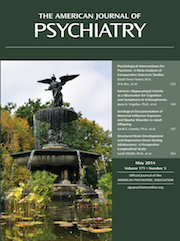Psychological Interventions for Psychosis: A Meta-Analysis of Comparative Outcome Studies
Abstract
Objective
Meta-analyses have demonstrated the efficacy of various interventions for psychosis, and a small number of studies have compared such interventions. The aim of this study was to provide further insight into the relative efficacy of psychological interventions for psychosis.
Method
Forty-eight outcome trials comparing psychological interventions for psychosis were identified. The comparisons included 3,295 participants. Categorization of interventions resulted in six interventions being compared against other interventions pooled. Hedges’ g was calculated for all comparisons. Risk of bias was assessed using four items of the Cochrane risk of bias tool, and sensitivity analyses were conducted. Researcher allegiance was assessed, and sensitivity analyses were conducted for robust significant findings.
Results
Cognitive-behavioral therapy (CBT) was significantly more efficacious than other interventions pooled in reducing positive symptoms (g=0.16). This finding was robust in all sensitivity analyses for risk of bias but lost significance in sensitivity analyses for researcher allegiance, which suffered from low power. Social skills training was significantly more efficacious in reducing negative symptoms (g=0.27). This finding was robust in sensitivity analyses for risk of bias and researcher allegiance. Significant findings for CBT, social skills training, and cognitive remediation for overall symptoms were not robust after sensitivity analyses. CBT was significantly more efficacious when compared directly with befriending for overall symptoms (g=0.42) and supportive counseling for positive symptoms (g=0.23).
Conclusions
There are small but reliable differences in efficacy between psychological interventions for psychosis, and they occur in a pattern consistent with the specific factors of particular interventions.



